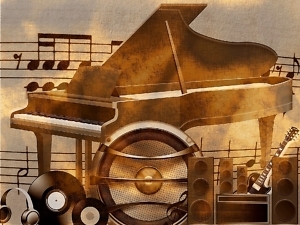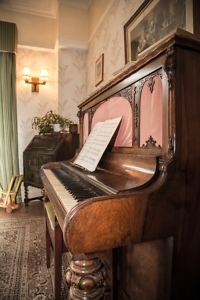Piano Lessons
When is a piano not a piano?
A European friend of mine finds one American trait puzzling and irritating. “You Americans,” he puffs, “no matter what your background, you always talk about how poor you were as children. It is statistically impossible that everyone in this country was born poor.”
 The American rags-to-riches story is a beloved one. We all want to believe our success is the result of hard work alone and has nothing to do with the moved-up starting line our background provided.
The American rags-to-riches story is a beloved one. We all want to believe our success is the result of hard work alone and has nothing to do with the moved-up starting line our background provided.
As a kid, I knew my family was not the poorest in our small Alabama town. There were kids in my class who wore the same clothes more than once a week. There were some who lived in shacks, rickety buildings that looked as if they might fall down any day. These homes were rarely owned and the family could be displaced at a moment’s notice. There were kids who were probably always a little hungry. I wasn’t ignorant of those problems.
Still, children want to be like their friends, and, next to my friends, I felt destitute. My family lived in a rental home until I was in seventh grade. We had only one car, which my father took to work the second shift in the cotton mill, meaning that I was never available for night activities unless some kind person gave me a ride. My friends talked about summer trips to the beach. We never went on a vacation because any extra money had to be saved to visit my grandparents in England, a feat we achieved at the end of my sixth-grade year.
However, it was not a house, car, or vacation that became my personal symbol of inferiority. When I visited my friends, every time I knocked on the front door, I could see it through the screen: the piano against one wall of the front room. In my memories, it is always in the same place, no matter which friend’s house. (And my memory may be accurate. After all, in the square rooms of 1960s’ houses, there weren’t a lot of options.) My family didn’t even have a front room, but that didn’t bother me. It was the piano I envied.
To me, the piano was the most magical and marvelous thing in the world. My piano-playing classmates shared a world of lessons and practices that they bonded over, and they always had something to do at the school talent show. (Carole King’s “So Far Away” was the go-to song during my middle-school years.) I imagined that practicing and playing might fill some of those empty hours at home when my father had the car all afternoon and evening.
I begged my parents for the piano I coveted. Of course, they knew many things I didn’t: One, our little house couldn’t hold an instrument the size of a small sofa; two, we couldn’t afford it; three, even if we somehow found an old one that was practically being given away, we couldn’t afford the lessons; and four, even if someone happened to be giving lessons for free, there was no way to get me there.
 So there was no piano for me. And it became a major regret. For years, I imagined how much fuller my life would be if I could strike up a tune at a party, if I had the secret knowledge of music that every one of my friends seemed to have acquired. I felt something was missing, something that made me a bit inferior to everyone I knew. Even after I moved away from home, at college and then at work, it seemed that everyone else had music lessons as children.
So there was no piano for me. And it became a major regret. For years, I imagined how much fuller my life would be if I could strike up a tune at a party, if I had the secret knowledge of music that every one of my friends seemed to have acquired. I felt something was missing, something that made me a bit inferior to everyone I knew. Even after I moved away from home, at college and then at work, it seemed that everyone else had music lessons as children.
Then one day, I had a revelation: I could still learn to play the piano. I live in Nashville, where on any given day someone is selling an instrument because the dream has died, or the dream has succeeded and a better version is needed. When one of my musician friends planned a move to Florida and wanted to sell his keyboard, I jumped at the chance. I work at a college, so the next semester I signed up for a beginners’ group piano class. The lifelong dream was within my reach.
Except it wasn’t. I discovered that I was not going to simply sit down at the keyboard and make beautiful sounds emerge. Playing required a lot of counting: whole notes, half notes, quarter notes. And I was not good at counting. I knew that the notes sounded different from each other when played, but I had a very hard time hearing the difference when I played them. By the end of the semester, I still wasn’t comfortable using both hands, and my instructor and I both despaired of my ever being able to think of the bar lines as anything other than commas, where I would pause as if by force.
I stayed with the piano for another two semesters taking individual lessons at the college, but it was clear that I was never going to play anything other than “Good King Wenceslas” from the Piano I Christmas book. And that was not going to be a crowd pleaser — at least, not more than once.
Despite my teacher’s insistence that I was making progress, I lost interest. And it didn’t help that when I commiserated with friends, they pointed out that children learn things faster, and if only I had taken lessons as a child …
Still, something told me this was not simply a lost childhood dream I was chasing. After all, if music had been my passion, I could have joined the band and learned another instrument. In fact, I have a vague memory of bringing home a clarinet and soon deciding it was too hard. And I had a toy organ. My sister had a toy guitar. Neither was ideal, but if I’d cared enough, I could have shown my parents how serious I was. Other kids had certainly done so. And I lived in the South, where part of the myth of country music is some kid picking up an old cheap guitar and learning to play.
It wasn’t until last year that all the pieces came together. I was reading Ben Folds’ memoir, A Dream about Lightning Bugs: A Life of Music and Cheap Lessons, and at one point, he notes that the piano is associated with “middle-class living room furniture.” I stopped and read that phrase again. And then I knew: It wasn’t the piano I loved, and it wasn’t the dream of becoming a musician.
I’d never been able to articulate it until that moment, but the piano stood for what I was not: middle class. I felt on the outside of my peer group, afraid that one day they would notice the difference between us and reject me. That fear nestled so deep inside that, even after my family had entered the lower middle class, then as an adult, when I was firmly entrenched in the status, I didn’t see myself that way. I was always posing and pretending, afraid that I would be found out. That is an awful lot of metaphorical weight for even a piano to bear.
I stopped the lessons but I still have the keyboard, and I haven’t totally given up on the idea of learning to play. After all, now that a piano is just a piano, it might actually be fun to return to “Good King Wenceslas.”

Copyright (c) 2019 by Faye Jones. All rights reserved. Faye Jones, dean of learning resources at Nashville State Community College, writes the Jolly Librarian blog for the college’s Mayfield Library. She earned her doctorate in nineteenth-century literature at Indiana University of Pennsylvania.


